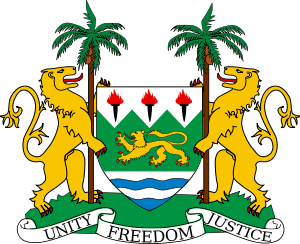Religion in Sierra Leone
Islam is the largest religion in Sierra Leone, with significant Christian and animist minorities. According to a 2009 estimate, 71.3% of the population is Muslim, 26.8% is Christian and 1.9% of the population is either animist or follows other religious beliefs.[1]
Other sources give different estimates. Muslims are estimated to comprise 60% of Sierra Leone's population according to the US Department of State,[3] while 20 to 30% are reported to be followers of Christianity, and 5 to 10% of the population practice indigenous animist beliefs.
The 2007 UNHCR's "Report on International Religious Freedom in Sierra Leone"[4] estimated 55% Muslim, 40% Christian and 5% other beliefs, with many citizens practising a mixture of Islam and traditional indigenous religious beliefs or Christianity and traditional indigenous beliefs. The Pew Research Center estimates the Muslim population at 78.0%.[5]
Islam in Sierra Leone
Muslims predominate in all of the country's three provinces and the Western Area, though formerly they were concentrated in the north with the south being mainly Christian.
The vast majority of Sierra Leonean Muslims are Sunni of Maliki school of jurisprudence; while small minorities are Shia and Ahmadiyya.
Christianity
The vast majority of Sierra Leonean Christians are Protestants, of which the largest are Methodists[6][7] and Evangelicals.[8][9] Other Christian protestant denominations in the country include Presbyterian,[10] Baptists,[11] Seventh-day Adventist[12] and Lutheran[13]
Catholics are the second largest non protestant Christians division in Sierra Leone at about 5% of the country's population.[14] The Jehovah’s Witnesses,[15] Anglicans[16] and Latter-day Saints[17][18] form a small minority of the Christian population in Sierra Leone.
Religious freedom
The constitution of Sierra Leone provides for freedom of religion and the government generally protects this right and does not tolerate its abuse.
References
- ↑ 1.0 1.1
- ↑ "Mapping The Global Muslim Population" (PDF). Retrieved 20 May 2012.
- ↑ "US Department of State estimate". State.gov. 14 September 2007. Retrieved 20 May 2012.
- ↑ United Nations High Commissioner for Refugees. "UNHCR.org". UNHCR.org. Retrieved 20 May 2012.
- ↑ http://www.pewforum.org/2012/12/18/table-religious-composition-by-country-in-percentages/
- ↑ World Council of Churches
- ↑ Maboleh United Methodist church
- ↑ The History of the Evangelical Fellowship of Sierra Leone
- ↑ Evangelical College of Theology
- ↑ Sierra Leone Presbytery Organization
- ↑ African American Baptist Mission of Sierra Leone
- ↑ Seventh-day Adventist Church Sierra Leone
- ↑
- ↑ Catholic Culture story
- ↑ Jehovah's Witnesses Sierra Leone
- ↑ Anglican Communion: Sierra Leone
- ↑ Church of Jesus Christ of Latter Day Saints: Sierra Leone
- ↑ Historic milestone: Sierra Leone stake marks LDS Church's 3,000th
Bibliography
- "Religion in Sierra Leone: All things happily to all men". The Economist. 31 May 2014. Retrieved 12 July 2014.
| |||||||||||||||||||||||||||||||||||||||||

